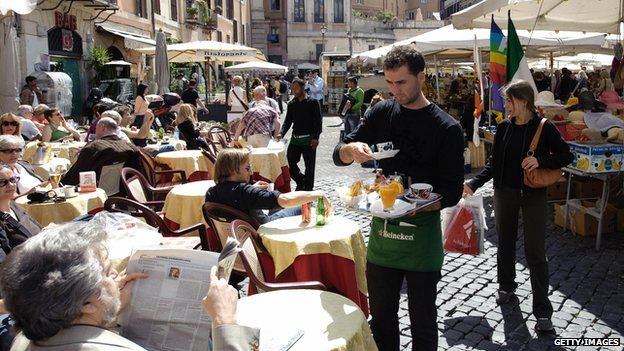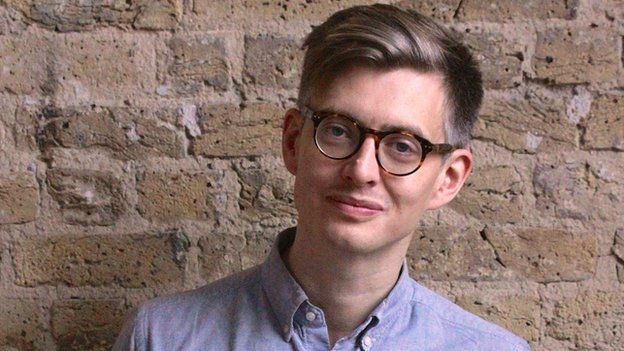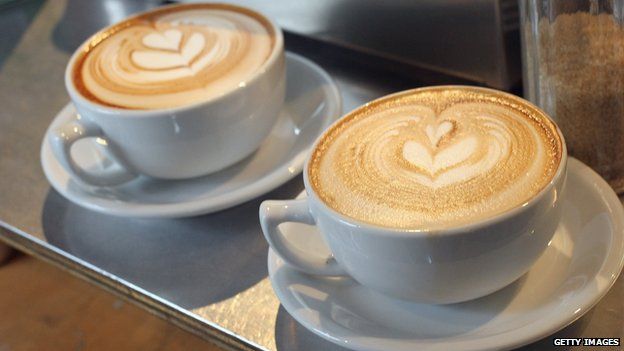Coffee: Do Italians do it better?
- 13 August 2015
- Business

Starbucks is everywhere, but not in Italy.
Yet Starbucks' founder, Howard Schultz, came up with the idea for his coffee chain whilst sipping espresso in a Milan bar.
So what? you may say. He took a good product, repackaged it and globalised it.
But to many Italians, the coffee served by Starbucks and other branded outlets is as far away from proper Italian coffee as you can get, despite the Italian-sounding offerings on their menus.
Now - time for disclosure - I am part-Italian and like most Italians, I like to think Italy represents the height of coffee culture, the standard against which all coffee should be measured.
When Italian friends and family shudder in disgust at the idea of sullying their precious cappuccino with a dash of hazelnut syrup or a sprinkling of cinnamon, I nod knowingly.

At home I have a moka machine, which is to the Italian kitchen what the kettle is to the British. As far as I'm concerned, the cappuccinos, lattes and espressos served in branded coffee chains taste scorched and bitter, a shabby imitation of the real thing.
But am I missing the point? Is my palate so provincial that it hasn't caught up with the changing tastes of the global coffee market? Because it appears that not only has Italian coffee been taken out of Italy, but the Italian is also being taken out of the coffee.
The International Coffee Organization says that globally consumption has grown by nearly 42% since the beginning of this century. So we're drinking more of it than ever before, which explains the expansion of many coffee chains in the past few decades, but we're not drinking it in the Italian way.
"I think a caricature of Italian espresso was what was exported," says award-winning barista James Hoffmann of London's Square Mile Coffee Roasters. He's part of a generation of highly-trained baristas driving innovation in the sector through more sophisticated espresso-based brews.
"Global espresso culture is now a long way from what is considered traditional Italian espresso," Mr Hoffmann says.
Coffee by numbers
8.5bn
kilos of coffee is consumed globally every year
50%
rise in global coffee production since 1990
- Finland has the highest per capita coffee habit at 11.4kg
- Italians drink much less per year consuming 5.8kg
- In the UK we are relatively light coffee drinkers at 2.8kg
You'd never, for example, ask for a latte in Italy. If you did, you'd get served a glass of milk. Neither would you ask for an espresso at a bar; "un caffe" is all you need to say. Coffee and espresso are synonymous in Italy.
Then there's the Australian "flat white", a halfway house between a Starbucks-style latte (25-35ml espresso shot topped by large amount of hot milk) and a macchiato (25-35ml espresso shot and a drop of hot, usually foamy, milk). The "flat white" has gone global, so much so that recently it replaced the cappuccino on Starbucks' menu in some parts of the US.
What's more, Italians don't lounge around in coffee shop armchairs sipping cappuccinos while browsing the internet. Instead they perch at the marble-topped counters of Italy's ubiquitous bars - not cafes - and throw back "un caffe" on the go.

Still, when it comes to taste and brewing style, Italy is trying to reclaim ground. The Italian Espresso National Institute or INEI was set up to protect Italian-style coffee drinking.
"International chains of cafes are spreading, calling the coffee they serve Italian espresso," writes INEI's chairman Luigi Zecchini on the organisation's website. But, "behind our espresso... there is a unique and unrepeatable culture."
INEI is even offering certificates to those who do it the "right" (for that read: Italian) way.
Are they fighting a losing battle? "Good roasting techniques and good cup-tasting protocols are becoming more and more international," says Jeremy Challender of London's Prufrock Coffee, another award-wining barista.
You can hear him teaching me how to make the perfect cup of coffee if you click here.
In any case, many top baristas also turn their noses up at what's served in branded coffee chains.
Square Mile Coffee's Mr Hoffmann says it's all down to the way the beans are roasted. Many chains roast their coffee darker which gives it a bitter flavour. Roasting lighter can achieve a more complex taste, but get it wrong and the coffee tastes sour.
"I think the theory is likely that consumers' tolerance for bitterness is higher than their tolerance for sourness," Mr Hoffman says."Hence the larger companies are erring on the side of caution."

But it also comes down to the raw beans themselves, and on this front Italy doesn't fare as well as many speciality coffee shops outside of the country.
Part of the problem is with the price of "un caffe". Most Italian bars will not charge more than one euro a cup.
"Such a low ceiling means the raw coffees in Italy are generally a little more commoditised, and there isn't the option to purchase more high quality coffee," Mr Hoffmann adds.
Italian flavour is held back too by the way the coffee is brewed. Bars there have a typical dose of around 7 grams of ground coffee per espresso, with very little variation. Speciality coffee shops will often use a lot more coffee - from 8 to 20 grams for a single espresso - yielding a more intense coffeeas a result.
That may be, but I still think I'll be sticking to home-brewed coffee from my trusted moka machine. And I'll continue to drink it the Italian way.
That means a short, sharp shot of espresso in the morning, perhaps even after dinner, but certainly no cappuccinos after 11am or any milk-based coffees after a meal. It doesn't agree with the digestion. Every Italian knows that.
Manuela Saragosa is a presenter on The Food Chain on BBC World Service. You can still hear her programme about the globalisation of the coffee industry here.
No comments:
Post a Comment
Please leave a comment-- or suggestions, particularly of topics and places you'd like to see covered